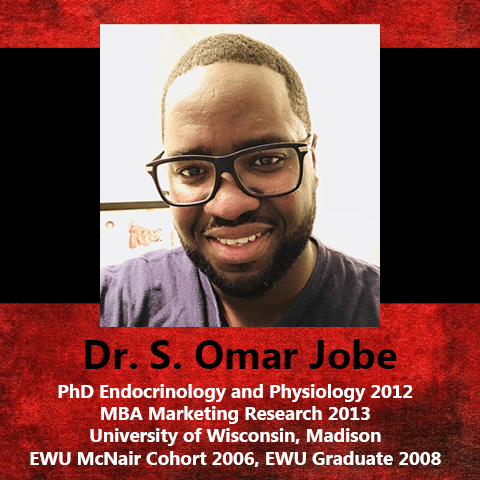
We are honored to have EWU McNair Alumna Dr. S. Omar Jobe joining us for our “Social Justice in Research” Plenary Session on June 2, at 9 am (register for free here). Dr. Jobe works as a Senior Manager in Medical Science Liaison at Edwards Lifesciences. Dr. Jobe will join 3 other EWU McNair alumni in this panel preceding the EWU Online Symposium, a collaboration between McNair and CSTEM. Dr. Jobe earned his PhD in Endocrinology and Physiology from University of Wisconsin-Madison in 2012. He went on to get his MBA in Marketing Research at UW-Madison as well. Dr. Jobe graduated from EWU in 2008 with a major in Biology. Below is an interview with Dr. Jobe about his thoughts on social justice and research.
Our Interview with Dr. S. Omar Jobe:
The focus of my role is field based scientific exchange, for which I leverage my scientific background, industry knowledge, and business acumen to act as a scientific resource to scientific experts and medical leaders as well as hospital administrators, while gathering insights that inform scientific objectives and strategic decision making.”
What work are you doing now?
The focus of my role is field based scientific exchange, for which I leverage my scientific background, industry knowledge, and business acumen to act as a scientific resource to scientific experts and medical leaders as well as hospital administrators, while gathering insights that inform scientific objectives and strategic decision making.”
What does “Social Justice in Research” mean to you?
Social justice in research and in my line of work means a commitment to social justice, means believing that everyone ought to be able to avoid preventable disease and escape premature death. Far too often, gross inequities mean that some groups succumb to disease and death disproportionately, while others’ advantages protect them, due to disparities in health care provision, political persecution, social strife, racial discrimination, and a plethora of other factors. My company makes medical devices for structural heart diseases and social justice in that sense means I have to do everything in my power to make sure our research and clinical trials represent the make up of the country and our devices are accessible and affordable to all.”
What do you see as the purpose of academic research in this current moment?
Academic research drives and increases our knowledge on a variety of topics and if it makes sure that knowledge integrates diverse perspectives and multidisciplinary approaches, then the knowledge gained can be use to positively change our communities and our lives.”
How did your undergraduate research experience prepare you for the next steps you have taken?
My undergraduate research was my first experience in structure and asking the right questions. I was mentored by Dr. Charles Herr who was by all accounts an intellectual of the highest order. He not only challenged me but also guided me to think independently and gave me confidence to believe in myself and my abilities. Those qualities were evident as soon as I started my PhD and accelerated my growth through the rigors of grad school.”
What advice would you give to an undergraduate researcher?
Take your research methodologies and fundamentals very seriously because no matter what the topic is and what the findings are, sound techniques and skills translate to all disciplines and levels. “
What advice would you give to an undergraduate faculty research mentor?
Try to balance being patient with making sure undergraduate researchers are challenged to ask the right questions and learn independence. You cannot be a good researcher until you are independent and can drive a project by yourself.”
Click here to register for the free “Social Justice in Research” panel on June 2nd at 9 am!

